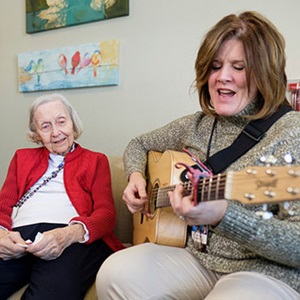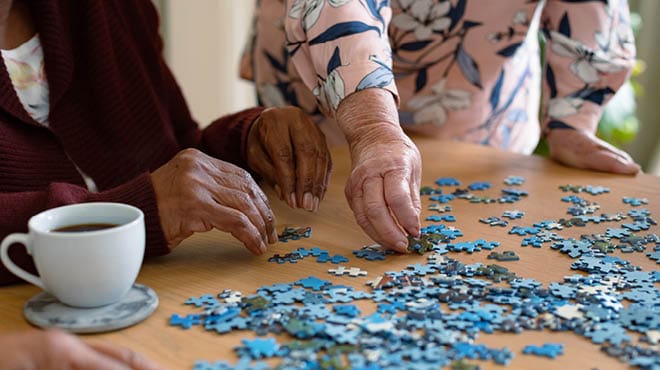Recent Posts
-

-
 Patient StoriesA lifesaver saved: An EMS veteran’s journey from rescue to recoveryNovember 14, 2025
Patient StoriesA lifesaver saved: An EMS veteran’s journey from rescue to recoveryNovember 14, 2025 -

Joan’s song: Music therapy brightens hospice patient’s days

“Can we sing?” asks Angela Joan Adkins, known by most people as Joan, during a recent music therapy session. Joan, 90, who now lives in a care facility in Eau Claire, Wisconsin, has unspecified dementia. Her family says music is her favorite activity.
Joan’s music therapist, Roxie Raykovich, part of the Hospice team from Mayo Clinic Health System, visits periodically, guitar or other instruments in tow, to lead Joan through some of her favorite songs.
“The music just lights her up,” says Joan’s daughter, Jane Modjeski. “She likes old hymns the best — ‘Amazing Grace’ and ‘What a Friend We Have in Jesus.’” Joan played piano and organ, and wrote Sunday school Christmas programs for several years.
A loss for words
A little over a year ago, Joan lost her ability to converse, a condition known as aphasia, but singing seems to bring back some of that ability.
“Her words get all jumbled up,” says Jane. “We know she is trying to say something. We all have just learned to converse with her.” Yet, when the music begins, she is able to sing many of the words, even when she doesn’t remember the song by its title. Joan might say she doesn’t know “Amazing Grace,” but then joins right in on high harmony. Her speaking also temporarily improves.
“She seems to be able to speak more clearly for an hour or two afterward,” says Roxie. “The music and the words together will get that part of the brain going.”
Listening to, singing and playing music stimulates various areas on both sides of the brain. Those areas control behavior, expression, decision-making, emotional reactions and memories, among other activities.
“Music is the only thing that engages both hemispheres of the brain,” says Roxie. “Depending on my goals for a session, I may use my guitar, keyboard, rhythm instruments, a reverie harp or singing.”
Those goals may include enhancing communication within the limits of the disease, increasing nonverbal expression, acknowledging and processing life changes, engaging in life review, and anticipatory grief with the patient and family.
“The fact that Joan most enjoys the hymns of her childhood is not surprising,” says Angie Oldenberg, a nurse practitioner in Neurology at Mayo Clinic Health System in Eau Claire. “Long-term memories are often the last to go. Some people cannot remember what happened that morning, but can recall a special event from 20 or 30 years ago.”
Looking at photo albums, talking about things that happened years ago or holding a childhood toy can help retrieve those memories. Engaging in physical activity, getting quality sleep and doing craft activities also can help slow the progression of dementia.
A personal touch
Roxie took a unique approach to bringing back some of those memories when she played a song written for Joan by her late son, Guy, who was a professional actor, singer and dancer, well-known in Chicago theatre. Guy, who passed away in 2010 at age 41 after a battle with cancer, wrote and recorded a song about Joan’s life, entitled, “Holy, Holy, Holy.”
“I like to ask if patients are musical,” says Roxie. “Besides Joan’s background in music, her family told me about Guy and the song he wrote for her. I decided to learn it. It was worth it to see her smile.”
Hearing and talking about the song seemed to bring back bittersweet memories for Joan.
“It’s been a long time,” she said after hearing Roxie sing it. “I think I’m going to cry.”
Roxie says music therapy isn’t just for the patient. Besides being proficient in music, her training in psychology and counseling prepares her to work with patients’ families.
“Family members who are having a hard time with the dying process also need support from the hospice team,” Roxie says. “Music is nonthreatening. Sometimes people who don’t want to open up will talk about the song and share their feelings.”
Joan’s family appreciates the joy the music brings to their mother.
“Our mom is the sweetest little thing in the whole world,” says Jane. “Music seems to lighten her mood. You can see it in her face. We’re so happy that hospice offers these opportunities.”


